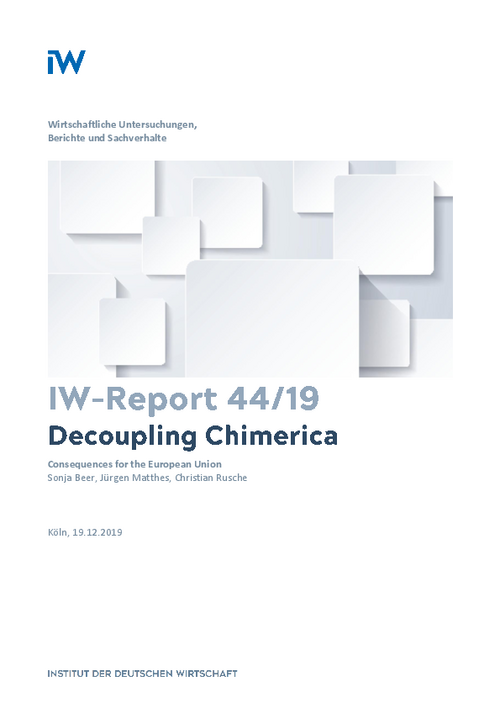The People’s Republic of China experienced a tremendous economic development within the last four decades. The increased economic power and political weight of China are challenging the USA and EU. Furthermore, the strategies used by China for its own development, e.g. broad-based industry policy with distortive subsidization, forced technology transfer or investment restrictions, are perceived as unfair, especially in the US, but to a large extent also in the EU.

Decoupling Chimerica: Consequences for the European Union
IW-Report

The People’s Republic of China experienced a tremendous economic development within the last four decades. The increased economic power and political weight of China are challenging the USA and EU. Furthermore, the strategies used by China for its own development, e.g. broad-based industry policy with distortive subsidization, forced technology transfer or investment restrictions, are perceived as unfair, especially in the US, but to a large extent also in the EU.
This development in combination with the trade imbalances are resulting in the current conflict between China and the US. The term decoupling was introduced to describe the cutting off of economic ties between China and the US as a consequence of the conflict.
Accordingly, we analyze in this article whether a decoupling is going on. We find that China and the US are each other’s most important trading partners. Trade data in value added reveals even closer links between both economies through global value chains. This is especially true for ICT and electronics. However, recent monthly data reveals that both the US share in Chinese imports and the Chinese share in the US imports has been decreasing. The trade war has obviously negative consequences on trade between China and the US. At the same time, this data seems to offer some evidence that trade diversion in favor of the EU might be taking place. But trade is not the only field where a decoupling takes place. While there are no patterns yet of a changed behaviour by US investors in the People’s Republic of China, there are signs of a changed Chinese investment behaviour concerning FDI. In fact, investments tend to be diverted to Europe. Moreover, there are also small changes of China’s share as a holder of US treasuries and its currency reserves.
In reaction to a potentially accelerating decoupling trend, the EU’s policy strategy needs to bear in mind that the US and the EU have clear common interests to lessen the impact of China’s economic distortions on the world economy. To achieve this aim, the EU is right in striving both for encompassing multilateral reforms, but also trying bilateral avenues with China. However, as the EU’s initiatives at the WTO and the ensuing minor progress are still insufficient, the EU should engage much more in coalition building around the proposals of its Concept paper. If China should eventually prove unable to limit the detrimental spillovers of its state capitalism to the world economy, the EU needs to prepare for a further escalation of trade conflicts. In such a scenario, hard choices would have to be made, involving, among other things, a stronger trade and competition policy and less economic dependence on China. Above all, the EU must be united in its policies and on its strategic geopolitical approach.

Sonja Beer/Jürgen Matthes/Christian Rusche: Decoupling Chimerica – Consequences for the European Union
IW-Report

More on the topic
Not so Different?: Dependency of the German and Italian Industry on China Intermediate Inputs
On average the German and Italian industry display a very similar intermediate input dependence on China, whether accounting for domestic inputs or not.
IW
China’s Trade Surplus – Implications for the World and for Europe
China’s merchandise trade surplus has reached an all-time high and is likely to rise further. A key driver appears to be a policy push to further bolster Chinese domestic manufacturing production, implying the danger of significant overcapacities.
IW